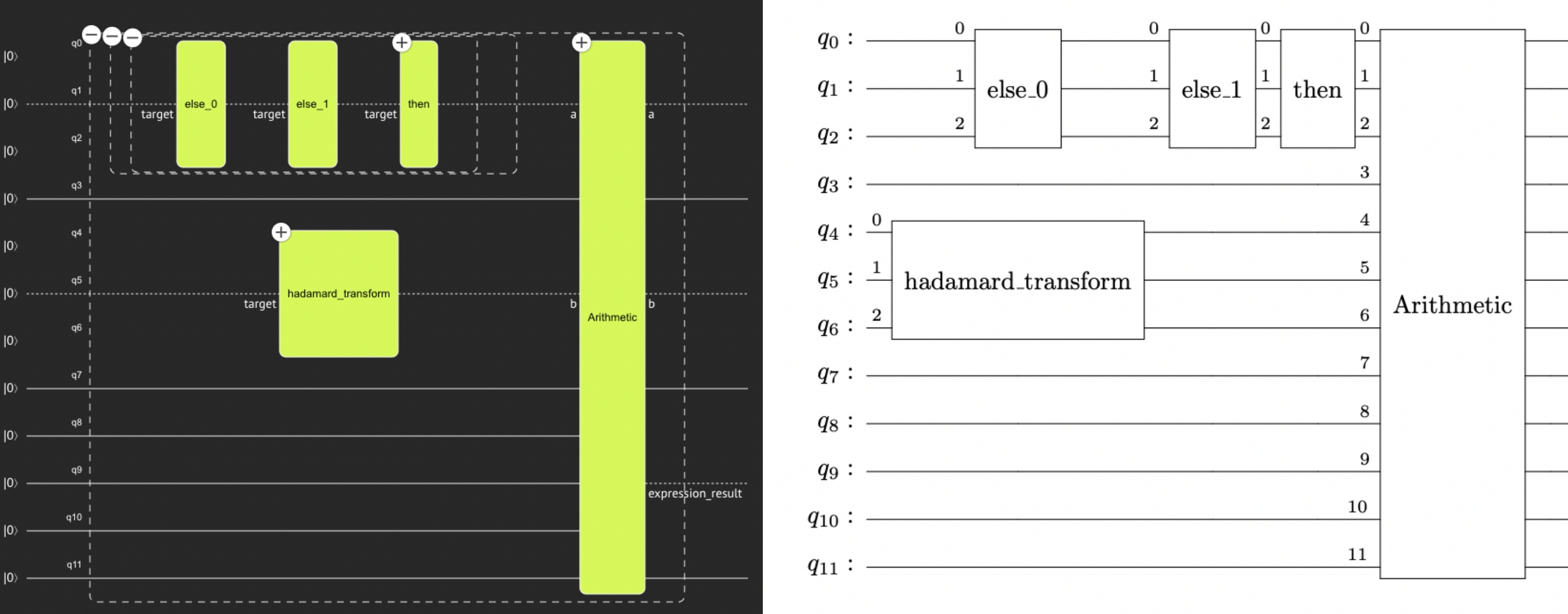0 41 0
Upgrade Instructions
- Python SDK
- The IDE upgrades automatically.
Enhancement
- Hardware-aware synthesis
will now use the Solovay-Kitaev algorithm to approximate
single-qubit gates when the basis gate set is a specific variation of
Clifford + T (
X,Z,H,T,CX, andCCX). qsvtfunction was added to the function library. See Quantum Singular Value Transformation.- A tutorial on discrete quantum walks was added to the tutorials library. See Discrete Quantum Walk.
- SDK: Quantum functions (
@qfunc) can be recursive. - SDK: PauliTerm can be used to declare a hamiltonian.
hamiltonian = [ PauliTerm(pauli=[Pauli.I], coefficient=1), PauliTerm(pauli=[Pauli.Z, Pauli.X], coefficient=2), ] -
Introducing ExecutionSession which will allow choosing the execution primitive in the SDK without the need of changing/synthesizing the quantum program once again.
model = create_model(main) qprog = synthesize(model) preferences = ExecutionPreferences(num_shots=1200) execution_session = ExecutionSession(qprog, preferences) # if the quantum program does not need any execution paramters: execution_session.sample() # if the quantum program needs execution parameters: execution_session.sample({"phi": 1}) # if multiple samples are needed: execution_session.batch_sample([{"phi": 1}, {"phi": 2}, {"phi": 3}]) # if an estimation is needed without execution parameters: hamiltonian = [ PauliTerm(pauli=[Pauli.I], coefficient=1), PauliTerm(pauli=[Pauli.Z], coefficient=2), ] execution_parameters.estimate(hamiltonian) # if an estimation is needed with execution paramters: execution_parameters.estimate(hamiltonian, {"theta": 1}) # if multiple estimations are needed: execution_parameters.batch_estimate(hamiltonian, [{"theta": 1}, {"theta": 2}]) -
A Qmod library reference, with usage examples for built-in and open library functions, can now be found in the function menu.
Interface Changes
- SDK: In
execute_qnn, the optional argumentobservablesof typePauliOperatorshas been replaced with the optional argumentobservableof typePauliOperator. -
Documentation: The structure and content have the classiq documentation have been changed signficantly with the following new structure:
- Classiq 101
- Explore
- Read
- Practice
- Reference Manual
- Release Notes
The old User Guide chapter from the previous documentation can be found in the new Reference Manual.
Deprecations
-
SDK: The
quantum_ifoperation and the oldcontrolsyntax have been removed. -
quantum_ifis removed. Usecontrolinstead. control(operand, ctrl)is no longer supported. Usecontrol(ctrl, operand)instead.-
control(n, operand)does not support quantum numeric variables (n). Instead, use abindoperation to castninto a quantum array, or comparento an integer explicitly (e.g.,n == 7). -
SDK: The
QParamtype has been removed. -
Instead of
QParam[int], useCInt. - Instead of
QParam[float], useCReal. - Instead of
QParam[bool], useCBool. - Instead of
QParam[List[...]], useCArray[...]. -
Instead of
QParam[Array[..., size]], useCArray[..., size]. -
Native Qmod: Accessing quantum variable properties (e.g.,
qbv.lenorn.is_signed) via function call syntax (len(qbv),is_signed(qbv)) is no longer supported. -
The field
optimizer_preferencesofExecutionPreferenceshas been removed. -
The function
set_initial_valueshas been removed.
IDE
- "Slack" and "Learn More" links were moved from the side drawer to the IDE header. New links were added as well: Community, User Guide.
- Allow visualization of larger circuits and prolong the timeout for visualization
-
Users can now download a LaTeX format of their quantum programs directly from the IDE, allowing for easy sharing, publication, and presentation of their work.

-
Cookies settings are now available to adjust the given consent at any time.
Bug fixes
- "selected example not found" error when opening the IDE
- Resetting now clears preferences form instead of initializing from cache on the model page
- Naming for exported files on the Graphical Editor
- State vector measurement results ordering
- Parameter names in lambda expressions don't have to match the parameter names in operand declarations:
qfunc my_H(qb: qbit) {
H(qb);
}
...
apply_to_all<my_H>(qba); // used to throw an error since "qb" != "target"
@qfunc
def my_H(qb: QBit) -> None:
H(qb)
...
apply_to_all(my_H, qba) # used to throw an error since "qb" != "target"